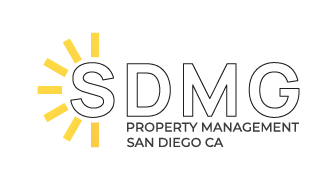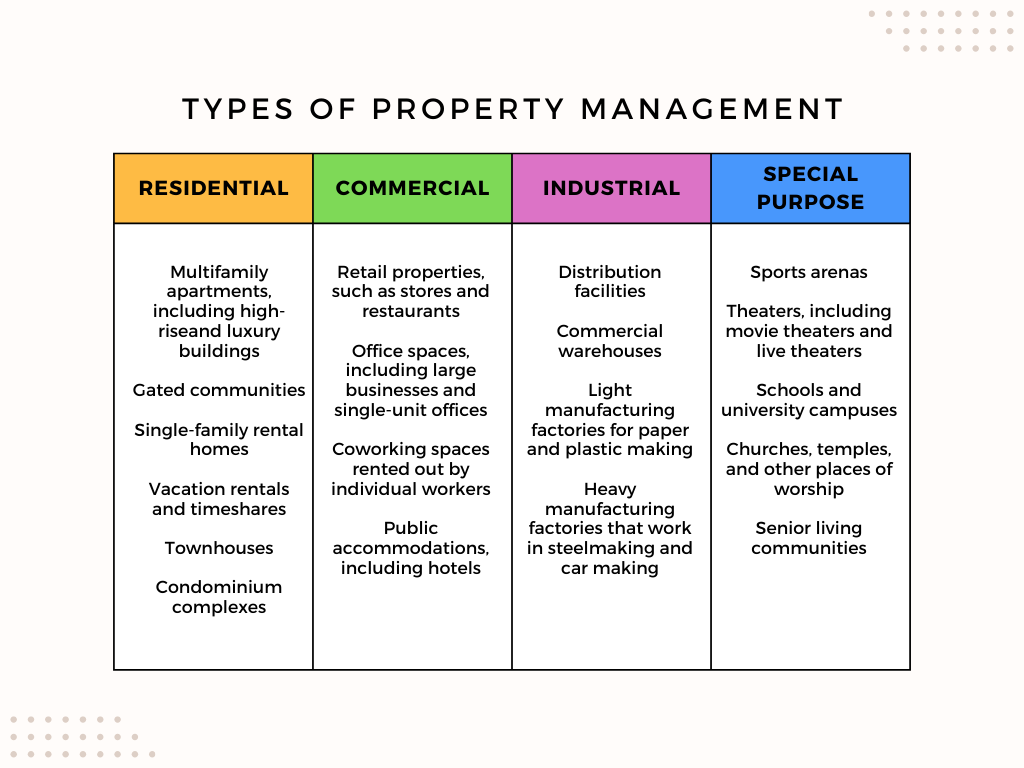Types of Property Management

Property managers offer a variety of services to keep rental properties running smoothly. The property management industry is quite diverse, with roles that focus on different segments of the property market.
Property management involves handling a wide range of properties, from residential homes and commercial offices to specialized facilities with specific needs. Each type of property brings its own challenges and requires specific skills to manage successfully. Understanding these differences is essential for property owners, investors, and anyone interested in a career in property management.
The four categories of property management include residential properties, commercial properties, industrial properties, and special-purpose properties. Learn about the unique responsibilities and demands of property managers for each type.
Residential Properties
Residential property management is all about operating, controlling, and overseeing residential properties on behalf of property owners. It’s a role with a wide range of tasks, all designed to keep properties running smoothly and profitably. From attracting and screening tenants to managing maintenance and finances, residential property managers play a critical role in the real estate industry.
One of the key duties of residential property management is finding and keeping good tenants. Property managers are responsible for marketing vacant units, conducting thorough tenant screenings, and selecting reliable renters. They also handle lease agreements, collect rent, and enforce lease terms, all while maintaining a positive relationship with tenants.
Good property management is also about being responsive to tenant needs. Property managers address tenant concerns and work to resolve issues quickly, whether it’s a maintenance request or a question about the lease. This focus on tenant satisfaction helps retain tenants and encourages lease renewals, reducing turnover and vacancy rates.
Keeping properties in top shape is another crucial aspect of residential property management. Property managers coordinate regular maintenance tasks like landscaping, cleaning, and general repairs. They also respond promptly to emergencies, such as plumbing or electrical issues, ensuring that the property remains safe and attractive for tenants. Effective maintenance increases tenant satisfaction and protects the property’s long-term value.
Financial management is also an important aspect of residential property management. Property managers are responsible for collecting rent, setting budgets, and preparing financial reports. They track income and expenses, manage operating costs, and provide property owners with detailed financial statements. By maintaining accurate records and implementing smart financial strategies, property managers help property owners maximize their return on investment.
Residential property managers must ensure compliance with all relevant legal and regulatory requirements. This includes adhering to fair housing laws, handling eviction procedures correctly, and following local and state regulations. Staying up to date with these rules helps property managers protect property owners from potential legal risks and penalties.
Commercial Properties
The role of a commercial property manager is overseeing, operating, and administering commercial real estate, which includes office buildings, retail spaces, and industrial complexes. The goal is to maximize the value and profitability of these properties while meeting the needs of both tenants and property owners. With responsibilities ranging from lease management and tenant relations to facility maintenance and financial oversight, commercial property management is an important part of the real estate industry.
Commercial property managers are responsible for lease management. This can include marketing available spaces and screening potential tenants to negotiating lease agreements and managing renewals. They can create lease terms that work for both tenants and property owners, while also ensuring rent is collected on time and the leasing term agreements are enforced.
Good tenant relations are essential in commercial property management. Property managers are the primary point of contact for tenants, responsible for addressing concerns, resolving conflicts, and facilitating smooth communication between tenants and property owners. The goal is to maintain a positive environment that encourages lease renewals and minimizes tenant turnover.
Keeping the property in excellent condition is another critical part of commercial property management. Property managers ensure that the building meets all safety and regulatory standards while coordinating routine maintenance, repairs, and renovations. They also handle emergencies, such as plumbing or electrical issues, to minimize disruptions to tenants.
Financial management plays a key role in commercial property management. Property managers are responsible for rent collection, budgeting, expense tracking, and financial reporting. They analyze financial data to monitor operating costs and ensure property owners receive regular financial updates. By maintaining accurate records and implementing financial strategies, property managers help property owners achieve their financial goals.
Lastly, commercial property managers must ensure compliance with a variety of legal and regulatory requirements. This includes staying updated on zoning laws, building codes, safety regulations, and other legal obligations. Property managers make sure the property and its operations meet all these standards, thereby reducing legal risks for property owners.
Industrial Properties
Industrial property management deals with managing, operating, and overseeing industrial real estate assets such as warehouses, manufacturing facilities, distribution centers, and industrial parks. It involves a range of tasks designed to ensure these properties run efficiently and meet the needs of tenants while generating a profitable return for property owners. Some of their roles include lease management, tenant relations, facility maintenance and operational efficiency.
One of the responsibilities in industrial property management is handling leases. Property managers are responsible for the entire leasing process, including marketing vacant spaces, screening prospective tenants, negotiating lease terms, and managing renewals. It’s important to tailor lease agreements to the needs of industrial tenants, such as storage requirements, loading docks, and transportation infrastructure.
Industrial property managers also handle tenant relations. They are the liaison between tenants and property owners, addressing concerns, facilitating communication, and resolving issues as they arise. They work closely with industrial tenants to understand their operational needs and ensure the property meets those requirements.
Maintenance and facility management are critical for the smooth operation of industrial properties. Property managers coordinate maintenance, repairs, and capital improvement projects, ensuring that the property remains functional and safe. They oversee equipment maintenance, coordinate with contractors, and implement preventive maintenance programs. Additionally, industrial property managers ensure compliance with safety regulations and environmental standards, creating a secure and sustainable work environment.
Operational efficiency is another key focus of industrial property management. Property managers work to optimize space utilization, assist with daily workflow, and improve logistics within industrial properties. They collaborate with tenants to identify opportunities for process improvements and cost reductions.
Financial management is a vital aspect of industrial property management. Property managers are responsible for collecting rent, managing expenses, setting budgets, and preparing financial reports. They analyze financial data to track operating costs and provide property owners with regular financial updates.
Special Purpose Properties
Special purpose property management focuses on the operation and oversight of properties with unique or specialized functions. These properties can include healthcare facilities, educational institutions, recreational centers, religious buildings, and other distinct spaces. Managing these properties requires the skills and knowledge to address their specific requirements and regulations.
A key responsibility in special purpose property management is ensuring compliance with industry-specific regulations and standards. Each type of special purpose property comes with its own legal and regulatory framework, which must be adhered to. Property managers need to stay informed about these regulations to ensure the property meets all safety, accessibility, and operational requirements.
Property managers are responsible for maintenance and operational tasks, such as organizing tasks tailored to the property’s needs. For example, managing a healthcare facility involves ensuring proper sterilization procedures, medical waste disposal, and compliance with patient care standards. In an educational institution, property managers must ensure classroom equipment is maintained and safety protocols are in place. The goal is to keep the property functional and compliant with specific industry standards.
Building positive relationships with occupants or users is another big aspect of special purpose property management. Property managers must understand the specific needs of those using the property and provide the appropriate support. This could involve coordinating with healthcare professionals in a medical facility or working closely with school administrators in an educational institution.
Special purpose property management often requires additional attention to operational support and safety measures. Property managers might need to arrange specialized training for staff or ensure emergency protocols are in place. For instance, managing a religious building could require additional coordination for large events, while recreational centers might need specific safety checks for playground equipment or swimming pools.
Learn more about the roles of property managers at https://propertymanagementsandiegoca.com/property-manager/

